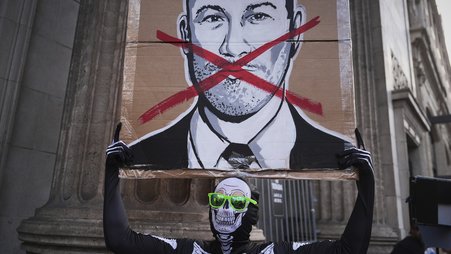Plenty of commentators — myself included — have scolded ABC and Meta for settling Donald Trump’s frivolous lawsuits to curry favor with the president, with CBS reportedly considering doing so. The criticism is deserved. How are journalists supposed to cover Trump’s rampant corruption when their employers participate in it?
But they’re not the only ones to blame for capitulating to Trump. So are the judges who bless these extortionate agreements. Judges, after all, don’t have to blindly sign off on litigants’ settlement agreements when there are glaring indicators of impropriety. Settlement agreements, like any other contract, can be voided if they are contrary to public policy.
Judges are entitled — maybe even obligated to — to inquire about, scrutinize, and ultimately reject settlements when there’s reason to believe they were procured via fraud, duress, collusion, or coercion, among other reasons.
Judges exercise these powers sparingly for multiple reasons, some good (not wanting to substitute their judgment for that of private parties) and some bad (not wanting to pass up an opportunity to clear a case from their docket). And they’re particularly reluctant to interfere in cases involving sophisticated parties with ample resources and high-quality legal representation. Disputes between billionaire presidents and gigantic corporations would ordinarily fit that bill.
But these are not ordinary times. In the case of CBS, for example, it’s been widely reported that the network is considering settling in hopes the Trump administration will look favorably upon its parent company’s merger plans. That’s despite the obviously frivolous nature of Trump’s legal theory that CBS violated consumer protection law by editing an interview for time.
Not only that, but CBS just produced a transcript of the interview that definitively shows there was nothing nefarious about the edits (it should be obvious but maybe it bears emphasizing: News outlets have the First Amendment right to edit interviews as they see fit). Since when do multibillion-dollar corporations settle cases when the only relevant piece of evidence exonerates them?
Or take Meta’s settlement, which came after its founder Mark Zuckerberg’s MAGA makeover and Trump ass-kissing tour. The $25 million settlement — for suspending Trump’s Facebook account after his role in the Jan. 6, 2021, insurrection — makes no sense as anything but a protection racket, given that the Supreme Court upheld social media platforms’ First Amendment rights to moderate content just last year. The Wall Street Journal also reported that Trump had made clear to Zuckerberg that he needs to pay up if he wants to be brought into the tent.
If a compromised Supreme Court can come up with a way to place presidents above the law, scrupulous trial judges can find a way not to facilitate bribery and extortion.
ABC’s settlement is the least egregious of the three (and that’s saying something). Even though the case was very defensible as a matter of defamation law, ABC’s characterization of the sexual abuse verdict against Trump as “rape” was arguably not entirely accurate. But $15 million? On what planet does one lose that much money because people believed they were a rapist as opposed to just a regular ho-hum sexual abuser? Not to mention that the money went to a potential slush fund, not necessarily a presidential library as many reported.
All of these settlements raise glaring red flags that courts should not acquiesce, especially when the Fourth Estate is involved.
It violates public policy — embodied by the First Amendment — for the courts to facilitate bribes paid by media publishers to presidents (especially when the purpose of the bribe is to ease the path to media consolidation that itself may be contrary to the public interest). All of this is out in the open, and judges should not bury their heads in the sand when asked to sign off on it.
In fact, judges don’t even have to let these cases get to a point where they’d need to scrutinize settlements — they can dismiss them outright as a sanction against the attorneys who bring them. They can also impose monetary sanctions to discourage further abuses.
Court rules, like Rule 11 of the Federal Rules of Civil Procedure and its state counterparts, allow judges to sanction lawyers who pursue legally baseless lawsuits, especially for improper purposes (like extorting defendants into paying the president to clear mergers). They can do this either at the request of a party to the case or on their own initiative.
Again, judges rarely exercise these powers, purportedly to avoid discouraging litigants from pursuing their rights or asserting novel legal theories. Lawyers frequently advise clients victimized by frivolous lawsuits not to bother seeking sanctions — not only is it seen as a waste of time and money, but some judges consider such requests irritating or distasteful. Essentially, they see lawyers as members of a fraternity that shouldn’t rat each other out.
But judges shouldn’t hide behind procedures and norms while the Constitution they’re sworn to uphold burns in their courtrooms.
I know I’m making this sound simpler than it is. This isn’t an exhaustive legal treatise. Judges have law clerks who can help them fully understand the scope of their powers to safeguard democracy in this moment. But they need to at least try.
If a compromised Supreme Court can come up with a way to place presidents above the law, scrupulous trial judges can find a way not to facilitate bribery and extortion.





